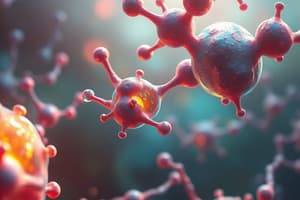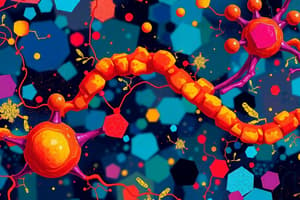Podcast
Questions and Answers
Quelle section d'un article de recherche en biochimie décrit comment les expériences ont été menées?
Quelle section d'un article de recherche en biochimie décrit comment les expériences ont été menées?
- Résultats
- Introduction
- Méthodes (correct)
- Discussion
Quelle technique est utilisée pour séparer et identifier les molécules en biochimie?
Quelle technique est utilisée pour séparer et identifier les molécules en biochimie?
- Cristallographie aux rayons X
- Chromatographie (correct)
- Spectrométrie de masse
- Microscopie électronique
Quelle section d'un article de recherche en biochimie interprète les résultats et réfléchit à leur signification?
Quelle section d'un article de recherche en biochimie interprète les résultats et réfléchit à leur signification?
- Introduction
- Résultats
- Discussion (correct)
- Méthodes
Quel type de source est essentiel à utiliser lors de la rédaction d'un article de recherche en biochimie?
Quel type de source est essentiel à utiliser lors de la rédaction d'un article de recherche en biochimie?
Quelle technique fournit des informations sur la structure des molécules en biochimie?
Quelle technique fournit des informations sur la structure des molécules en biochimie?
Study Notes
Discovering the World of Biochemistry
Biochemistry, a fascinating field within biology, explores the chemical processes that occur within living organisms. This topic encompasses the study of molecular structures, chemical reactions, and interactions that drive cellular function and life itself. To understand biochemistry better, let's delve into its core components and the scientific process behind studying it.
Molecular Basics
Biochemistry primarily deals with macromolecules, such as carbohydrates, lipids, proteins, and nucleic acids, which are essential for life. These molecules are composed of smaller building blocks, like amino acids, nucleotides, and monosaccharides, which participate in countless biological reactions.
Metabolic Pathways
Cells use metabolic pathways to convert nutrients into biomolecules, generating energy through processes like glycolysis, the citric acid cycle, and oxidative phosphorylation. Metabolic pathways also enable the synthesis and breakdown of biomolecules, allowing cells to maintain their structure and function.
Enzymes and Reaction Kinetics
Enzymes are biological catalysts that speed up chemical reactions by lowering their activation energy. The study of enzyme kinetics helps scientists understand how enzymes work and how they are regulated.
Homeostasis and Signal Transduction
Biochemistry plays a vital role in maintaining the internal environment of an organism, known as homeostasis. Signal transduction pathways, such as the G protein-coupled receptor pathway, enable cells to respond to external signals and coordinate a wide range of physiological processes.
Research Methods and Techniques
Research in biochemistry relies on a variety of techniques. Techniques such as chromatography, mass spectrometry, and gel electrophoresis are used to separate and identify molecules, while techniques like X-ray crystallography and cryo-electron microscopy provide information about their structure.
Writing a Biochemistry Research Paper
A biochemistry research paper typically follows a specific format, with key sections such as an introduction, methods, results, discussion, and conclusion. The introduction outlines the research question, hypothesis, and relevant background information. The methods section describes how the experiments were conducted, including the materials, procedures, and statistical analyses. The results section presents the data, while the discussion section interprets the results and reflects on their significance in the context of the existing literature.
When writing a research paper, it's essential to use credible and peer-reviewed sources, avoid personal blogs and social networks, and include accurate and comprehensive references. The bibliography should be formatted according to a standardized citation style, such as the APA or MLA.
Biochemistry is a vast and ever-evolving field with numerous applications. From drug development to understanding the molecular basis of diseases, biochemistry continues to provide fundamental insights into the inner workings of life. As a student of biology, taking the time to explore this exciting field can open up countless opportunities for learning and discovery. https://www.reddit.com/r/biology/comments/an3c31/help_writing_a_research_paper/ https://www.ncbi.nlm.nih.gov/pmc/articles/PMC3474301/ https://www.reddit.com/r/biology/comments/g7hl9e/how_to_read_research_papers/?rdt=53337 https://esajournals.onlinelibrary.wiley.com/doi/full/10.1002/bes2.1258 https://biologyjunction.com/a-step-by-step-guide-on-writing-a-biology-research-paper/
Studying That Suits You
Use AI to generate personalized quizzes and flashcards to suit your learning preferences.
Description
Delve into the world of biochemistry to understand macromolecules, metabolic pathways, enzymes, homeostasis, signal transduction, and research methods. Learn about the core components of biochemistry and the scientific process behind studying it. Discover the fascinating field that explores the chemical processes within living organisms.




